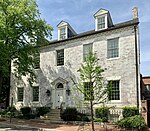Prospect House (Washington, D.C.)
Georgetown (Washington, D.C.)Houses completed in 1788Houses on the National Register of Historic Places in Washington, D.C.Individually listed contributing properties to historic districts on the National Register in Washington, D.C.NRHP infobox with nocat ... and 2 more
Washington, D.C., Registered Historic Place stubsWilliam Thornton buildings

Prospect House (also known as the Lingan-Templeman House) is a historic building, located at 3508 Prospect Street, Northwest, Washington, D.C., in the Georgetown neighborhood.
Excerpt from the Wikipedia article Prospect House (Washington, D.C.) (License: CC BY-SA 3.0, Authors, Images).Prospect House (Washington, D.C.)
O Street Northwest, Washington Georgetown
Geographical coordinates (GPS) Address Phone number Website Nearby Places Show on map
Geographical coordinates (GPS)
| Latitude | Longitude |
|---|---|
| N 38.905858333333 ° | E -77.069605555556 ° |
Address
Georgetown University
O Street Northwest 3700
20057 Washington, Georgetown
District of Columbia, United States
Open on Google Maps








